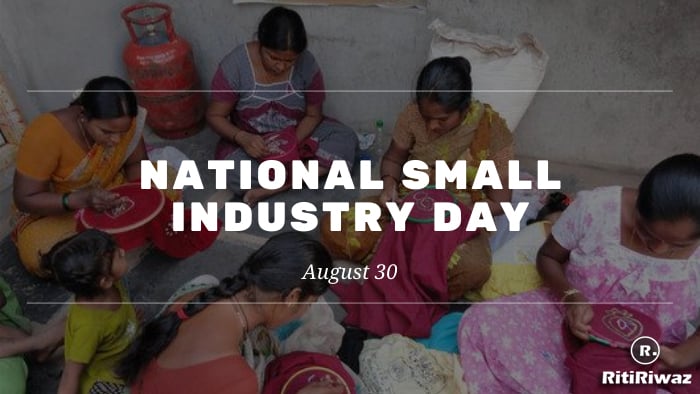National Small Industries Day

National Small Industries Day is observed on August 30 with the aim of promoting small-scale industries and providing employment opportunities to the unemployed. Small scale industries have an important role in economic development in a developing country like India. Keeping in view the strategic importance in the overall economic development of India, a special emphasis has been laid on the need for the development of the small-scale sector. Accordingly, the trend of policy support from the government for small-scale industries has been supportive and favorable for the development of the small enterprise-class.
What are Small scale industries?
Small scale industries are those industries that are carried out on a small scale and are generally run with the help of local workers and laborers. Industries in which 10 to 50 people work together in return for wages are covered under small-scale industries. Small Scale Industries is an industrial undertaking with fixed assets in investment plants and machinery. The investment in fixed assets in plant & machinery, whether held on ownership term or on the lease or hire purchase, does not exceed Rs. 1Crore. This investment limit varies from time to time by the government. In a small-scale industry, goods are sourced from outside and technical skills can also be obtained from outside.
Entrepreneurs in small-scale sectors are normally not required to obtain a license either from the Central Government or the State Government for setting up units in any part of the country. Its registration with the State Directorate or Commissioner of Industries or DIC’s makes the unit eligible for availing of different types of Government assistance like financial assistance, medium and long term loans from State Financial Corporations, and other commercial banks.
Small scale industry and cottage industry have played an essential role in the Indian economy. Since ancient times, the best quality goods have been produced in the small and cottage industries of India. Although this sector like other Indian industries underwent a huge decline in British rule, it has developed at a very rapid pace after independence.
Suggested Read: Akshay Urja Diwas
Objectives of Small Scale Industries:
-
The main objective of small-scale industries is to solve the problem of unemployment and semi-unemployment by increasing employment opportunities as the unit of capital employed by them is relatively labor-intensive.
-
The second main objective is to have an equal distribution of economic power. Cottage and small-scale industries commercialize economic power.
-
Industrial marketing is possible through small-scale industries. With this, the economic development of the country is possible by reducing the technological balance and regional technological disparity.
-
Due to labor-intensive technology, there is an abundance of workers. Therefore, it is necessary that they establish industrial peace.
-
The civilization and culture of the country are protected through small-scale industries. Most small and medium industries manufacture artistic and traditional goods and mostly these industries are based on labor-intensive technology, which reinforces the spirit of mutual goodwill, equality, and brotherhood in the industries.
-
The main objective of small-scale industries is to make optimum use of natural resources.
-
Create a sense of ‘simple living high thoughts’ in terms of human values.
-
In order to make the trade balance and the balance of payments favorable, it is necessary that they earn more foreign currency.
-
Their main objective is to provide the best goods to the general public.
-
Playing an important role in the Indian economy, they aim to produce as best as possible.
Ministry of micro, small and medium enterprises
The government of India in order to promote small and budding entrepreneurs decided to establish a government agency that can mediate and provide help to small-scale industries (SSI). The Ministry of Micro, Small, and Medium Enterprises acts as the nodal agency for the growth and development of SSIs in the country. The Micro, Small, and Medium Enterprises (MSME) sector has emerged as a highly vibrant and dynamic sector of the Indian economy over the last five decades.
MSMEs not only play a crucial role in providing large employment opportunities at comparatively lower capital costs than large industries but also help in the industrialization of rural & backward areas, thereby, reducing regional imbalances, assuring more equitable distribution of national income and wealth. MSMEs are complementary to large industries as ancillary units and this sector contributes enormously to the socio-economic development of the country. Various other public sector enterprises assist the Ministry of Small Scale Industries like –
-
The ‘Small Industries Development Organization‘ (SIDO) is the apex body to assist the Government in formulating its policy and supervising the implementation, formulating programs, projects, plans.
-
The ‘National Small Industries Corporation Limited (NSIC) was established by the ‘Government of India’ with a view to promote, support, and nurture small-scale industries in the country, with a focus on commercial aspects of their operations.
-
The Ministry has set up three National Enterprise Development Institutes, which are engaged in training centers, undertaking research and training, and consultancy services for enterprise development in the field of small-scale industries.
Types of Small Scale Industries
All types of small-scale industries found in India whether in the manufacturing sector or service sector are divided into five types:
1. Manufacturing Industries: Those units which are producing complete articles for direct consumption and also for processing industries are called manufacturing industries. For example, Power looms engineering industries, coin industries, khadi industries, food processing industries, etc.
2. Ancillary Industries: The industries which are producing parts and components and rendering services to large industries are called ancillary industries.
3. Service Industries: Service industries are those which are covering light repair shops necessary to maintain mechanical equipment. These industries are essentially machine-based.
4. Feeder Industries: Feeder industries are those which are specializing in certain types of products and services, e.g. casting, electroplating, welding, etc.
5. Mining or Quarries: Small mines and quarries are extremely diverse in nature, but comprise a repository of extremely poor people.
Suggested Read: Women Equality Day
What activities are covered in Small Scale Industries
List of activities which are recognized as Small Scale Service and Business (Industry Related) Enterprises (SSSBEs) are Advertising Agencies, Marketing Consultancy, Industrial Consultancy, Equipment Rental & Leasing Typing Centers, Photocopying Centers, Industrial Photography, Industrial R& D Labs, Industrial Testing Labs, Desk Top Publishing.
Internet Browsing/Setting up of Cyber Cafes, Auto repair, services and garages, Documentary Films on themes like Family Planning, Social forestry, energy conservation and commercial advertising Laboratories engaged in Testing of Raw Materials, Finished Products “Servicing Industry” undertakings engaged in maintenance, repair, testing or electronic/electrical equipment/instruments Laundry and Dry Cleaning X-Ray Clinic Tailoring Servicing of agriculture farm equipment e.g. Tractor, Pump, Rig, Boring Machine, etc Weigh Bridge.
Photographic Lab Blue Printing and enlargement of drawing/designs facilities ISD/STD Booths Teleprinter/Fax Services Sub-Contracting Exchanges (SCXs) established by Industry Associations EDP Institutes established by Voluntary Associations/NonGovernment Organization Colored, Black and White’s studios equipped with processing laboratory Ropeways in hilly areas Installation and operation of Cable T.V. Network Operating EPABX under franchises Beauty Parlours and Creches.






